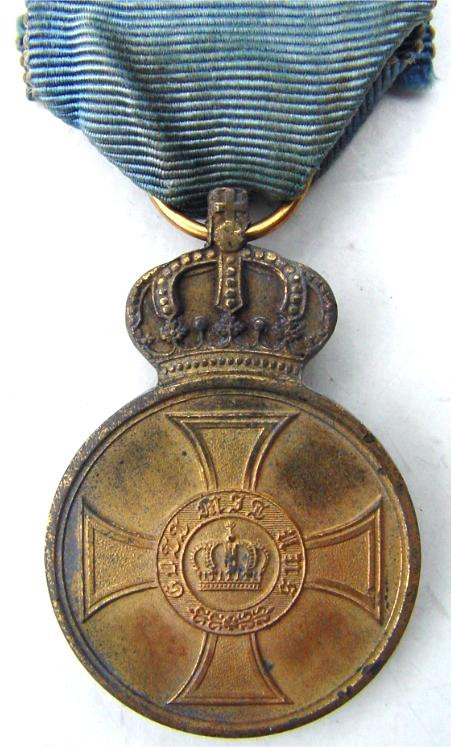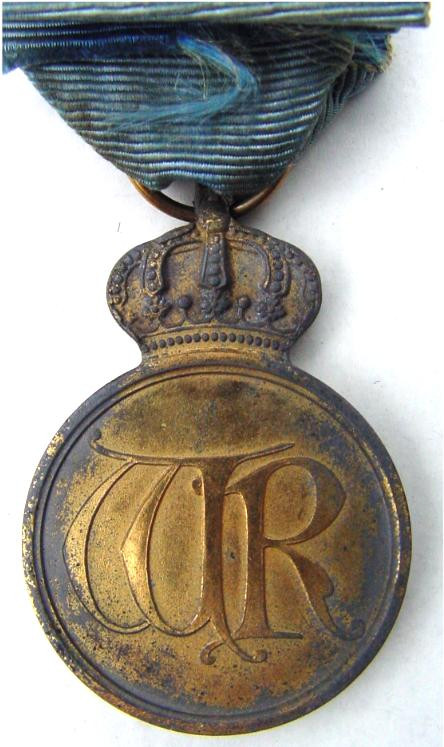On December 1, 1888, Wilhelm
II. instituted the Prussian Crown-Order-Medal without
setting up an institution document. On December 3, 1888,
he submitted the "Allerhöchst genehmigten Festsetzungen
über die Verleihungen der Krieger-Verdienst-,
Kronen-Orden- und Rothen Adler-Medaille (institution
about the Warrior-Merit-, the Crown-Order- and the Red
Eagle-Medal)" to the President of the State Ministry and
to the Minister of Foreign Affairs, Fürsten von
Bismarck. It came with the following words:
|
"1. |
Die Krieger-Verdienst-Medaille
wird nur an Mannschaften nichtpreußischer
Truppenteile vom Feldwebel abwärts und zwar
a) an solche Truppen, welche unlängst an einem
Feldzuge teilgenommen haben, am schwarzweißen,
b) wo dies nicht der Fall ist, am weißschwarzen
Bande verliehen.
( The Warrior-Merit-Medal will be awarded only to
non-Prussian troops below the military grade of a sergeant
a) to such troops, that already took part in one
siege, on the black and white ribbon
b) on the white and black ribbon to troops that did not see any action.)
|
|
2. |
Die
Kronen-Orden-Medaille wird nur an Unterbedienstete (Lakaien,
Leibjäger, Kammerdiener, Hoffouriere pp)
nichtpreußischer Hofhaltungen und zwar nur am
statutenmäßigen Bande verliehen.
(The Crown-Order-Medal will be awarded to
non-Prussian state servants, but only on the
white and orange ribbon.)
|
|
3. |
Die Rothe Adler-Medaille
gilt den sub 1 und 2 bezeichneten Medaillen
gegenüber als die höhere und wird am orangeweißen
Bande nur an solche Personen verliehen, welche die
Krieger-Verdienst-Medaille bzw. die
Kronen-Orden-Medaille gemäß 1b bzw. 2 bereits
besitzen.
(The Red Eagle-Medal is of higher rank compared to the medals in
1 and 2 and will be awarded on an
orange and white ribbon only to those who
already have been awarded with the Warrior-Merit-Medal
or Crown-Order-Medal after 1b or 2.)
|
An Mannschaften, die
gemäß 1a die Krieger-Verdienst-Medaille am
schwarzweißen Bande besitzen, wird als höhere
Dekoration nicht die Rothe Adler-Medaille, sondern das
Militär-Ehrenzeichen 2. Klasse eventl. 1. Klasse
verliehen werden.
(the Red Eagle-Medal will not be awarded to enlisted men, who after 1a already have been
awarded with the Warrior-Merit-Medal on the black and
white ribbon, as a higher decoration, but the
Military-Honor-Medal 2nd and under certain circumstances the 1st
class)"
On July 11, Bismarck was
informed that the Crown Order Medal could also be
awarded to non-Prussian state servants that were under
private contract.
The background for the
institution of the Crown-Order-Medal was that Wilhelm
II. now had a medal he could award to people that didn't
belong to the military or were states servants. The Red
Eagle-Medal and the Medal for Common Merit were not designed for these purposes.
At least 5,037 medals
have been awarded between 1888 and 1918.
The design changed during it's existents. It was made in gilt bronze until
September 1916, and then in gilt zinc. Attached to the
medal was a crown. The crown went through various design changes. Until September 1916, the crown was
welded to the medal. After this date, the medal and the
crown were coined in one piece, with parts of the crown
sawed out. The last model was only coined and left
massive without doing any work to the crown. This type
was used in 1918.
|

|

|
|
averse
|
reverse
|
While you can find the
early types quite often in auctions or on medal trade shows,
the last model is very rare and difficult to obtain. No
wonder, in 1918 only only 38 medals were awarded in total:
|
01.02.1918.
|
Aufenthalt S.M. in
Konstantinopel
|
|
22.02.1918
|
Aufenthelt des Kaisers
von Österreich in Bad Homburg v.d.H.
|
|
12.05.1918
|
Anwesenheit des Kaisers
von Österreich im Gr.H.Q.
|
| 08.06.1918 |
Hinterstellung des
Hofzuges in Trelon und Bosmont im (Gr.H.Q.) |
| 20.06.1918 |
Anwesenheit des
Kaisers von Österreich im Gr.H.Q. |
| 14.08.1918 |
Anwesenheit des
Kaisers von Österreich im Gr.H.Q. |
| 20.06.1918 |
Anwesenheit S.M. bei
Krupp |
© A.
Schulze Ising, II/99
|